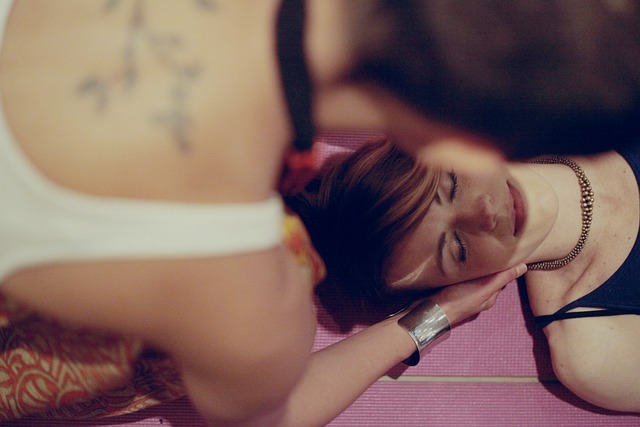Sleep is vital for physical fitness routines, offering muscle recovery, hormone regulation, and cognitive function support. To optimize sleep, maintain consistent schedules (7-9 hours), create a relaxing bedtime ritual, and ensure a cool, dark bedroom. Regular strength training improves sleep quality and recovery, while lifestyle adjustments, exercise timing, and nutrition choices also enhance sleep. Prioritizing sleep is key for athletes to achieve peak performance through balanced physical fitness routines.
Maximize your physical fitness routines with a strategic approach to sleep optimization. Understanding the profound role of sleep in recovery, muscle repair, and overall athletic performance is key. This article delves into evidence-based strategies to enhance sleep quality, from optimizing rest periods to incorporating targeted strength training. We explore lifestyle adjustments that synergize with physical activity, promoting restorative sleep essential for peak fitness and well-being.
- Understanding Sleep's Role in Physical Fitness Routines
- Strategies to Optimize Your Sleep for Recovery
- Incorporating Strength Training for Restful Sleep
- Lifestyle Adjustments for Better Sleep Quality and Physical Performance
Understanding Sleep's Role in Physical Fitness Routines

Sleep is a cornerstone of any successful physical fitness routine, often overlooked yet undeniably crucial for optimal performance and recovery. During sleep, our bodies undergo significant processes that repair and rejuvenate muscles, consolidate memories, and regulate hormones responsible for growth and metabolism. For athletes and fitness enthusiasts, this translates to improved strength, endurance, and overall athletic ability.
Adequate sleep allows the body to efficiently remove metabolic waste products from working muscles, reducing inflammation and soreness. This recovery process is essential for muscle repair and growth, which are fundamental to enhancing physical performance over time. Moreover, quality sleep contributes to better cognitive function, allowing individuals to make sound decisions, react quicker, and maintain focus during training sessions—all vital components of a well-rounded fitness journey.
Strategies to Optimize Your Sleep for Recovery

Optimizing your sleep is a crucial aspect of any successful physical fitness routine. Quality rest is essential for muscle recovery and growth, hormone regulation, and cognitive function. To enhance your sleep for peak performance, consider implementing consistent sleep schedules, aiming for 7-9 hours nightly. Creating a relaxing bedtime ritual can signal to your body that it’s time to wind down, making it easier to fall asleep and enjoy deeper rest.
Additionally, crafting an ideal sleep environment is vital. Keep your bedroom cool, dark, and quiet. Invest in comfortable bedding and limit exposure to electronic devices before bed, as the blue light they emit can disrupt your natural sleep-wake cycle. By prioritizing sleep within your physical fitness routines, you’ll wake up feeling refreshed, energized, and ready to tackle your next training session or active day.
Incorporating Strength Training for Restful Sleep

Incorporating strength training into your daily physical fitness routines can significantly impact your sleep quality and overall recovery. Exercise, particularly resistance or strength training, plays a dual role in promoting both physical and mental well-being. When you engage in intense workouts, your body initiates several physiological changes that prepare it for rest and repair. This process involves the release of certain hormones and neurotransmitters that signal to your brain that it’s time to wind down and sleep.
Moreover, strength training helps regulate your internal clock by influencing the production of melatonin, a hormone responsible for controlling sleep-wake cycles. Regular physical activity can lead to better sleep onset, increased total sleep time, and improved sleep efficiency. By incorporating strength exercises into your fitness routine, you not only build muscle but also create a harmonious cycle that enhances recovery and prepares your body for a restful night’s sleep.
Lifestyle Adjustments for Better Sleep Quality and Physical Performance

In the pursuit of optimal recovery and strength, prioritizing sleep is paramount for athletes and fitness enthusiasts alike. Lifestyle adjustments play a pivotal role in enhancing sleep quality, which directly impacts physical performance. Adopting consistent sleep schedules ensures your body’s natural rhythm aligns with your training regimen. Creating a relaxing bedtime routine, such as dimming lights and avoiding electronic devices an hour before sleep, can signal to your body that it’s time to wind down. Incorporating regular exercise into your physical fitness routines not only promotes better sleep but also strengthens muscles and improves overall well-being. However, it’s crucial to time workouts appropriately; intense exercises too close to bedtime may interfere with sleep, so consider scheduling them earlier in the day.
Nutrition choices significantly influence sleep quality. Avoiding stimulants like caffeine late in the day can help regulate sleep patterns. Instead, opt for calming foods rich in magnesium and tryptophan, such as walnuts, bananas, and turkey, which support serotonin and melatonin production, facilitating deeper, more restorative sleep. Moreover, maintaining a balanced diet ensures your body receives the necessary nutrients for muscle recovery and overall physical performance.
Optimizing sleep is a key component of any successful physical fitness routine. By understanding the vital role sleep plays in recovery, strength, and overall performance, individuals can implement effective strategies to enhance their sleep quality. Incorporating strength training, making lifestyle adjustments, and adopting consistent sleep patterns can lead to significant improvements in both athletic abilities and overall well-being. Remember that adequate rest is just as important as rigorous training when striving for peak physical fitness.
